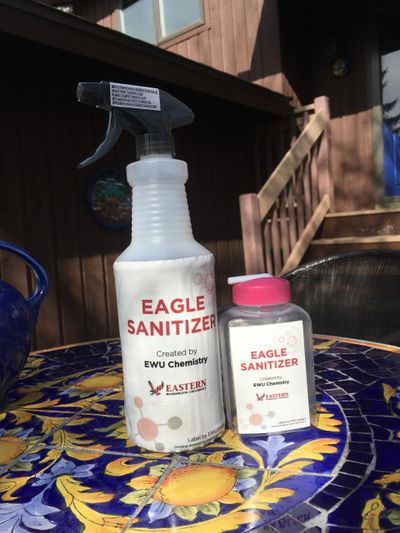Making a clean break: Retiring EWU professor creates, distributes Eagle Sanitizer

After 39 years at Eastern Washington University, Jeff Corkill, a professor of chemistry and biochemistry, imagined his final quarter going a little differently.
He would teach a few more classes, guide students through a few more labs, then, come June, would ease into retirement.
But because of the coronavirus, Corkill, like many teachers, has been forced to teach via websites like Zoom. Corkill had never taught an online class in his decades at Eastern, so this was a big change.
“It’s nowhere near as rewarding,” he said. “One of the things I always enjoy about teaching is the face -to -face with students and being able to interact with them. … I just have to tell them, ‘This is an experiment. You have to be flexible. You can’t get stuck in your ways because things are going to change as I learn to do this and you learn.’
“It’s OK, it’s just different. It’s not how I envisioned the end of my career.”
Though he can no longer enjoy the face-to-face interactions with students, Corkill is still doing what he can to make an impact on EWU and the Inland Northwest community by creating Eagle Sanitizer.
The idea came simply enough. Corkill looked at the ingredients in sanitizer and realized those chemicals were readily available in EWU labs.
Corkill then reached out to Fred Joslin, lab manager and science instructional technician, and asked how much of each ingredient was available and how much sanitizer he thought that would create.
With the chemicals already on hand, the pair made about 5 or 6 gallons of sanitizer.
“The mixing only took probably an hour or so,” Corkill said. “It actually took longer to fill the bottles. That was like being on a conveyor belt.”
After ensuring the sanitizer met FDA requirements, Corkill and Joslin approached the people who handle legal issues at EWU to make sure it was OK to give away state property.
They were given the all-clear to distribute the sanitizer because of the pandemic – and because they weren’t making money on the sanitizer.
“As faculty, we get a certain amount of money for professional development, which is usually used either to go to a conference or for research, and since we can’t go to meetings and we can’t do research, that money was just sitting there, and we used that money to buy the chemicals,” Corkill said. “That was OK with Eastern and the state to do that.”
When it came to bottling the sanitizer, Corkill and Joslin knew they wanted two sizes: a large bottle with a spray nozzle and a smaller bottle for individual use. They ended up finding the bottles at the Dollar Tree.
In an effort to get as many people involved in the project as he could, Corkill reached out to Mindy Breen, professor of engineering and design, and asked if she had a student who would be interested in designing a label for the bottles.
Student Danielle Flinn designed the label, and there also are drug facts on the back of the bottle as required by the FDA. Spokane’s Instant Sign Factory printed the labels for free.
Sam Buzby, director of marketing, and Dave Meany, director of communications and media relations, helped get the word out about Eagle Sanitizer.
Corkill first distributed the Eagle Sanitizer to the Cheney and EWU police departments. He then donated bottles to Cheney firefighters and EMTs and those in City Hall and the Cheney Care Center.
In Spokane, Eagle Sanitizer went to Catholic Charities, Union Gospel Mission, Second Harvest, the Vanessa Behan Crisis Nursery, the downtown library, the Spokane Veterans Home and two senior centers on the South Hill.
“We thought we had quite a bit, but by the time we went to all these places, I thought, ‘Oh, that’s it,’ ” Corkill said. “We’ll make some more in the next couple weeks, and then perhaps find some other places we didn’t hit this time and go back to some of the more important ones, like Catholic Charities and the Mission and the Spokane Vets Home, I think are critical.”
In a follow-up email, Corkill reiterated that while teaching online does not make up for face-to-face contact with students, what he considers the best part of teaching, creating and distributing Eagle Sanitizer “makes up somewhat for some of the pleasure of being a teacher.”
“The pleasant thing about it was seeing the gratitude of the people when you give it out,” he said. “That was nice, so it made it feel worthwhile and made me want to continue it on and make some more.”